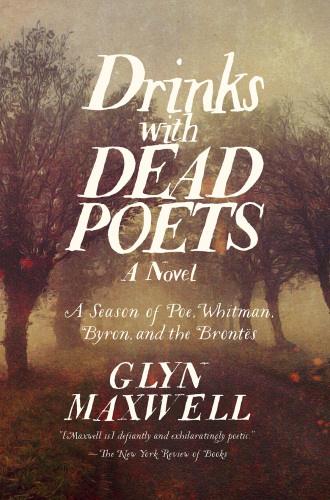
Drinks With Dead Poets
A Season of Poe, Whitman, Byron, and the Brontes
کتاب های مرتبط
- اطلاعات
- نقد و بررسی
- دیدگاه کاربران
نقد و بررسی

June 1, 2017
Dream, fantasy, coma, or afterlife? One of these surely explains why an established poet wakes up one day to find himself in a tiny English village teaching a poetry course and enjoying visits from Keats, Whitman, Dickinson, and other literary geniuses.Like an upscale version of the Web series "Comedians in Cars Getting Coffee," British poet and playwright Maxwell's (On Poetry, 2012, etc.) novel presents intimate conversations with stars of Western civilization's poetic canon along with liberal quantities of alcohol. The Brownings, Coleridge, Yeats, and more take turns visiting a nameless village in contemporary England where the Academy is holding a series of fall courses and author/central character Glyn Maxwell is teaching poetry to a group of eight students. Exercises, individual tutorials, and seminars on the work of landmark poets are enhanced by appearances from the long-dead writers themselves; they perform readings, take Q-and-A sessions, and often end up in the pub afterward. But this isn't real life, and Maxwell knows it. So is he dead? Why is it always Thursday? And when can he leave? This curiosity of a book is threaded with questions, some of which are answered by the poets in their own words, which have been culled by Maxwell from diaries, essays, and letters. Poe complains: "I've made no money"; Byron--a big, confident hit with the students--comments: "Don't be afraid of praising me too highly." Part comic novel, part confession, part literary critique, Maxwell's book is both creative and self-indulgent, packed with quotations, musings, and dissections of rhyme schemes. The book's fictional elements (characters, plot) play a poor second to its expansive, good-natured embrace of all things poetic. Within the loose format of a campus novel lurks a peculiar but not unpersuasive agglomeration of ideas, opinions, and imaginings about poets and their work.
COPYRIGHT(2017) Kirkus Reviews, ALL RIGHTS RESERVED.

June 15, 2017
At the start of this novel-cum-course syllabus, Maxwell, award-winning British poet and protagonist/narrator, materializes on a road outside an idyllic English university town. He's not sure whether he's dreaming or in heaven, but he knows he's teaching a poetry course and that the ghosts of the poets on his 12-week syllabus will appear, one each week, for a reading to his class. The novel, nearly incoherent at times, is rife with Britishisms (milk float, anyone?), yet like the best poetry, there is much to be found between the lines and blank spaces. Classroom camaraderie blooms over the term; we're thrust into an adjunct professor's frustrations and feel the glorious high of teaching. Visiting poets Keats, Poe, Coleridge (stoned again!), John Clare, and Byron, to mention a few, become real to us, and their ramblings, extracted from their actual writings, are no more random than any guest lecturer's. VERDICT If 19th-century poetry is a gap in your education, Maxwell's charming and learned novel will fill it more than you could hope. It joins his marvelous nonfiction text, On Poetry; reading both is not required, but you'll want to.--Reba Leiding, emeritus, James Madison Univ. Lib., Harrisonburg, VA
Copyright 2017 Library Journal, LLC Used with permission.

August 28, 2017
Famous poets help a teacher with his writing seminar at a dreamlike university in this metafictional novel from poet Maxwell (One Thousand Nights and Counting). Glyn Maxwell is a writer and professor teaching a class at a remote unnamed college, and every week the poet he is teaching to the class mysteriously shows up to do a reading. Nobody seems to find it odd when Lord Byron and Walt Whitman mysteriously show up on campus—nobody except for Glyn himself, who is trying to figure out how he arrived on campus, where he is exactly, how he ended up teaching this class, and why every day is a Thursday. The author Maxwell blurs the lines between prose and poetry and between fiction and reality as he takes readers on a surreal journey full of literary criticism and metrical analyses, all guided by the visiting poets who speak entirely in quotes from their real-life journals and letters. The surreal quality of the writing is offset by Maxwell’s wonderfully dry sense of humor. Readers of metafiction will enjoy this rabbit hole of luminary poets.

Starred review from June 1, 2017
Prolific British poet and playwright Maxwell follows his inspiring nonfiction book, On Poetry (2013), with an intoxicating sequel in the form of a novel. But this novel packs so much truth and so many conspicuously educational momentsalong with character studies of 12 major nineteenth-century poets and writersthat it defies classification. Our hero is poetry professor Glyn Maxwell, who is transported on Thursdays to an unknown location where he teaches curious students who drink too much and aspire to poetic greatness. But here's the thing: attending every class is the apparently real-life dead poet about whom author Maxwell had planned to lecture. The poets take over the classes, speaking only those words that are recorded in their writings. Glyn isn't sure if he is dreaming (or dead), but Thursdays are the only days he feels alivereally alive and usually drunk. What makes this book so much fun to read is the blend of narrator Maxwell's crazy thoughts, the students' shenanigans, and the portraits of campus personalities, all superimposed on snippets of fabulous poetry and interactions with dead poets whom we turn out to know better than we think. Some readers may want to look into On Poetry before tackling this intoxicating blend of fiction, memoir, and literary criticism, and further reading might include Nicholson Baker's The Anthologist (2009) and Rachel Cusk's Outline(2015).(Reprinted with permission of Booklist, copyright 2017, American Library Association.)

























دیدگاه کاربران